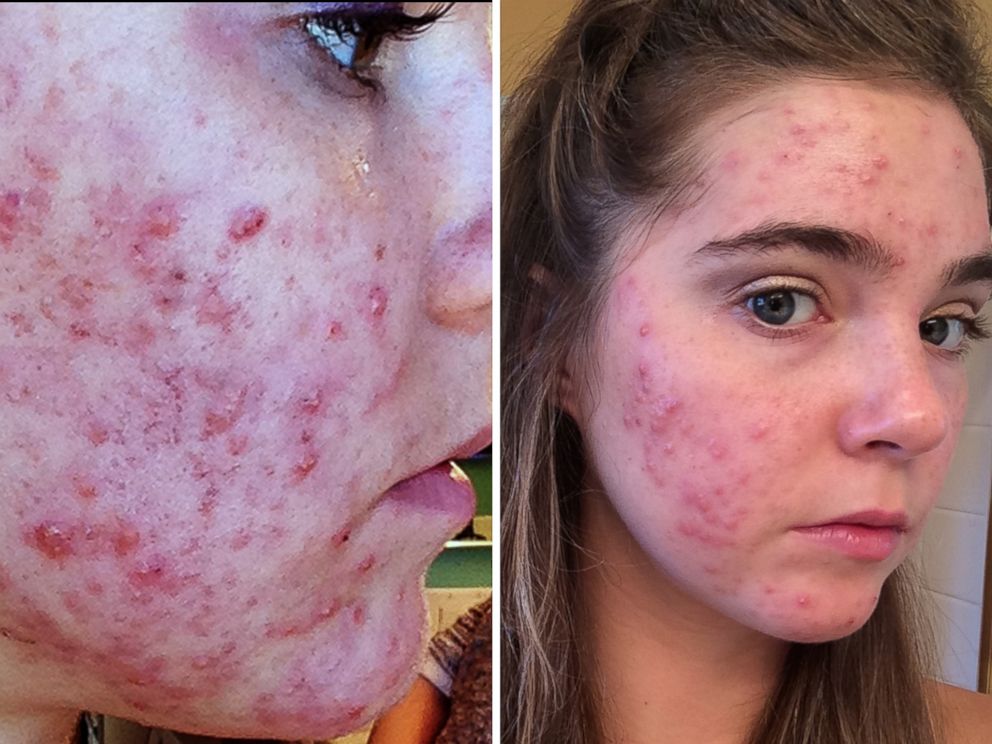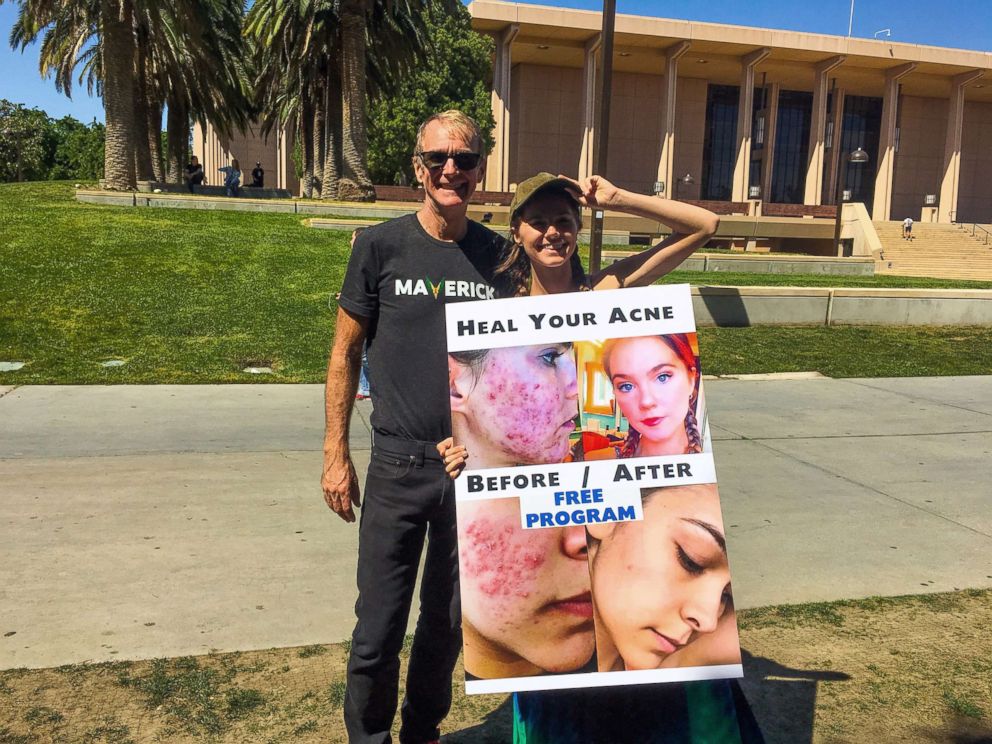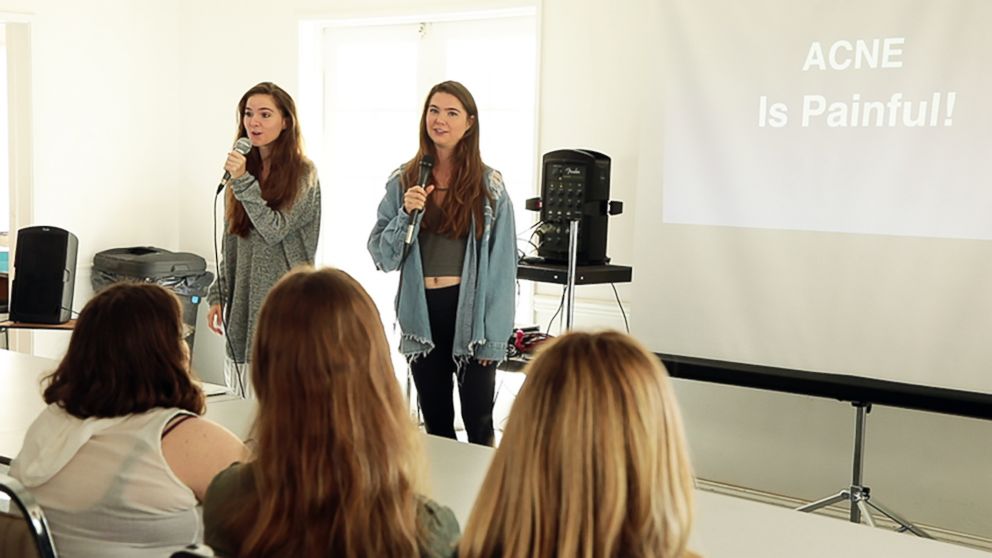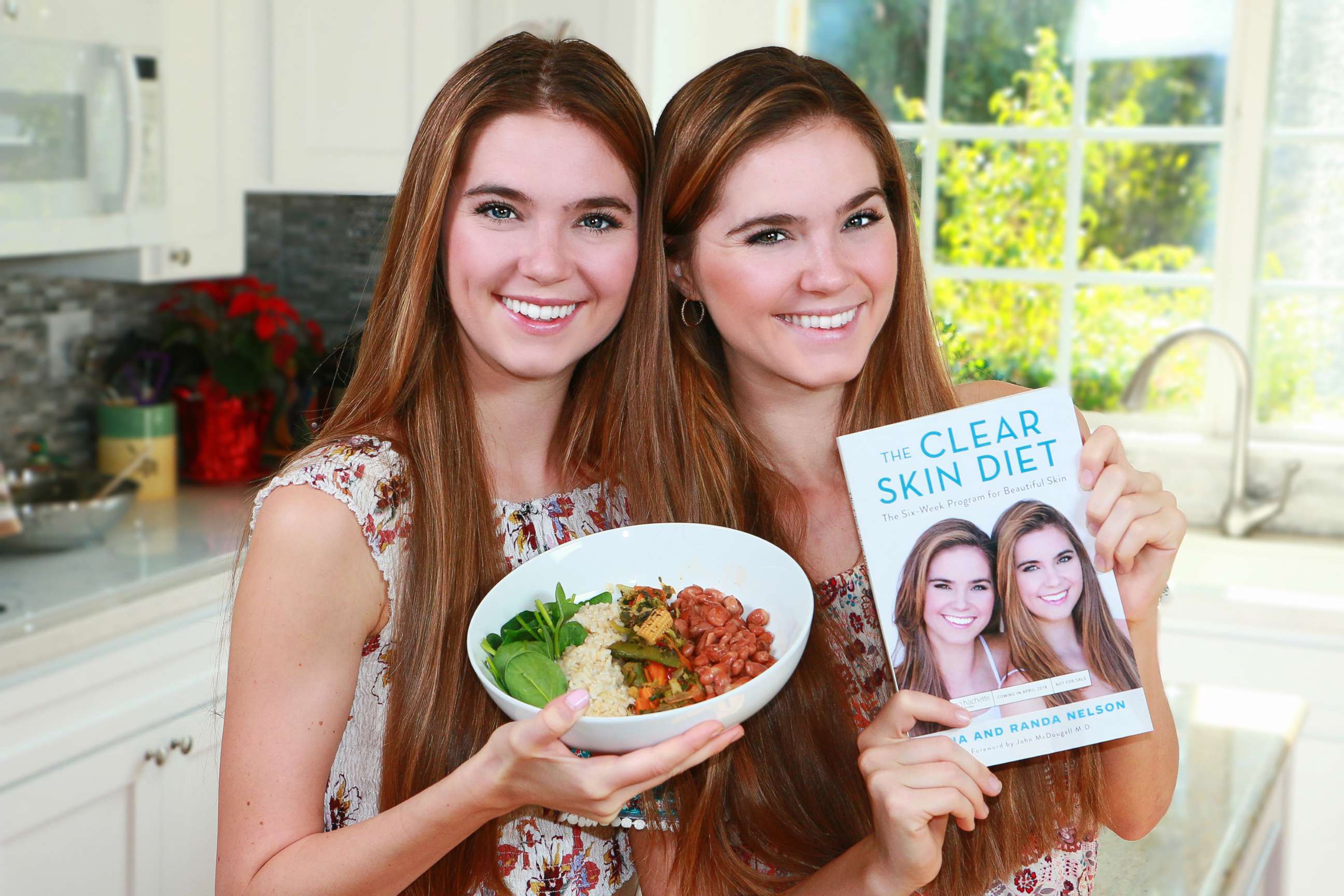YouTube stars who battled acne say they cleared skin through a low-fat diet
Nina and Randa Nelson are 24-year-old twins who live their lives in the public eye, with more than 600,000 subscribers to their YouTube channel.
The willingness to be in the public spotlight is a turn for the sisters who say they had acne so severe at the age of 20 that it paralyzed their lives and their acting ambitions.

“I remember vividly the day so well when my acne was at like its peak and I had an audition,” Randa Nelson told ABC News. “I just remember standing in the audition and I didn’t even want to look in the casting director’s eyes."
She continued, “I could not help but have this negative voice in my head. I became depressed. I wasn’t even myself because I didn’t want anyone to see me looking like that.”
The Nelsons, who live in Chatsworth, California, described the acne as both physically and emotionally painful.
Both depression and anxiety are common problems among acne-sufferers, experts say.
“If we did go out we’d have these big, floppy hats on, or just go out in the dark,” said Nina Nelson. “Anybody who has experienced what it’s like can sympathize.”

The sisters said they endured a nearly one-year cycle of taking medication to clear the acne and then watching the acne return, often worse, when the medication ended.
The Nelsons’ acne was so severe they were sent to a specialist with a months-long waiting list for an appointment. When the doctor recommended a medication that came with a long list of possible side effects, Nina and Randa Nelson decided to try a new approach.
The sisters overhauled their diet, following a plan rich in vegetables and low in fat.
“I would say we ate pretty healthy before we changed our diet,” Nina Nelson said. “We’d have oatmeal with soy milk or peanut butter and toast in the morning, beans and rice with avocado on a burrito for lunch and pasta with an oil sauce for dinner.”
She continued, “It wasn’t super high fat but even just small amounts [of fat] made a huge difference in our skin.”
Their new low-fat, plant-based eating plan, which is detailed in the sisters’ book, “The Clear Skin Diet,” began to clear up their skin within days, according to the Nelsons.
“It was just diet,” said Nina Nelson, who noted she and sister were no longer taking medication at the time. “We didn’t even change up our [skincare] products.”

While following the diet plan, Nina and Randa Nelson said they used only cleansing gel and an oil-free moisturizer, supplemented by an occasional face mask. The skincare products they used -- and continue to use today -- were products available in drugstores, not prescription, the Nelsons said.
The American Academy of Dermatology Association (AAD), which represents more than 20,000 dermatologists around the world, does not endorse dietary changes as a treatment for acne.
"Given the current data, no specific dietary changes are recommended in the management of acne," the AAD states on its website. "Emerging data suggests that high glycemic index (GI) diets may be associated with acne. Limited evidence suggests that some dairy, particularly skim milk, may influence acne."
The sisters, whose experience is their own and not based on medical research, say they remain acne-free four years later and still eat a low-fat, plant-based diet, focusing on foods like oatmeal, potatoes, vegetables, beans and fruit.
Diet and acne
The diet plan in "Clear Skin Diet," according to the Nelsons, is largely inspired by the work of Dr. John McDougall, a physician who is a high-profile advocate of a plant-based diet.
"When we were babies our mom had a rare autoimmune disease and went vegan [on Dr. McDougall's plan] and two months later she went into remission," recalled Nina Nelson. "Our dad was like, 'Why don't you look up to see if Dr. McDougall has something on acne?' and he did."
McDougall, who wrote the foreword to "The Clear Skin Diet," writes on his website that a "high-fat diet increases the amounts of fats in and on the skin," which causes acne in susceptible people. According to McDougall, dairy products, meat and poultry are known to increase insulin-like growth hormone-1, elevated levels of which are "associated with more acne."
Dr. Steven Lawenda, who lost more than 70 pounds following a plant-based diet, is a primary care physician at Kaiser Permanente Medical Group in Los Angeles. He consulted Nina and Randa Nelson for their book and admits research is still in the early stages when it comes to the role diet may play in solving acne.

"There were a number of years that it was dismissed that diet had anything to do with acne, but now it's getting more attention," he said, citing studies that have found dairy and high-glycemic foods to cause acne in many people.
The association between diet and acne remains contentious in the medical field, as the AAD statement makes clear.
Nina and Randa Nelson relied on a team of 15 chefs, medical doctors, dietitians and nutrition experts to inform their book. There is no research included in the book on the sisters' specific claims and the foods on the diet.
Lawenda said he is intrigued by research showing that when certain hormones in the body, including insulin-like growth hormone-1, are elevated, acne worsens, as do some chronic diseases.
"The diet that is healthy for acne seems to be the diet that is helpful for keeping weight down, preventing or reversing diabetes and heart disease and likely preventing many cancers," he said. "There appear to be common pathways that likely explain the links between these diseases."
'I can fix this. It's going to be okay.'
Nina and Randa Nelson decided to write a book after getting an overwhelming amount of feedback when they shared their story on YouTube.
"We realized this could help a lot of people," said Nina Nelson. "It's truly life-changing."
While writing their book, the Nelsons conducted study groups with students at a local college. They recruited students by holding up signs featuring Nina Nelson's before and after photos.

In their first study group, the sisters recruited around 15 people who attended weekly meetings, followed a low-fat, plant-based diet and were evaluated medically by Lawenda.
In the second study group, in 2016, the sisters had 130 participants.

"I noticed, over the course of a month, that they had significant improvements in their acne and felt better," said Lawenda, who monitored both study groups. "I was able to witness the before and afters firsthand."
The key to success, according to the Nelsons and Lawenda, is to strictly follow the low-fat, plant-based diet plan for at least six weeks.
"We suggest that people try the diet long enough to clear their skin and then if they want to add [other foods] back in, that's fine," said Randa Nelson. "And some people, they can successfully add fats in and their skin is fine, but other people breakout, so it just depends [on the individual]."
The Nelsons' six-week plan may not be easy to follow for many. It calls for getting just 10 percent of calories from fat, while the typical American diet gets around 35 percent of calories from fat, according to their book.

Foods ranging from avocados to vegetable oil, peanut butter, yogurt, ice cream, soy, olives, hummus, coconut and nuts and seeds are not allowed on the Nelsons' plan. Fruits, vegetables, and starches -- from whole grain sources -- are encouraged at whatever quantity it takes to feel satisfied.
"When you feel hungry, eat," the sisters write in "Clear Skin Diet," which is on sale now. "Don't worry about whether you ate two hours ago, or what time you may want to eat. Hungry at midnight? Eat at midnight."
The benefit of pursuing a remedy for acne via diet, according to Nina Nelson, is that it gives the person suffering from acne a sense of control.
"It's nice to know you can take control," she said. "If you're dealing with a breakout, you can be like, 'I can fix this. It's going to be OK.'"




